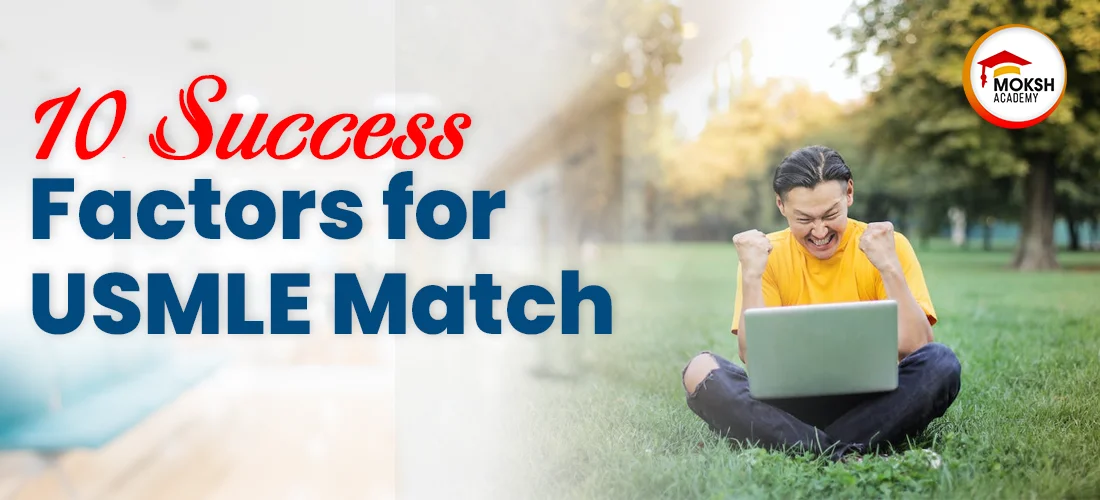-
Jan 09, 2024
-
MOKSH Academy

Here are the ten most important factors in residency match that can contribute to passing the United States Medical Licencing Examination (USMLE) and matching successfully:
- Competitive USMLE scores: While Step 1 scores are now pass/fail, it is still crucial to demonstrate a firm grasp of fundamental medical concepts. Step 2 scores, however, are pivotal in determining your eligibility for your desired specialty. Therefore, taking the Step 2 exam only when you are thoroughly prepared and confident in achieving a competitive score is advisable.
- Clinical experience: Gaining relevant clinical experience through rotations, internships, or volunteer work is crucial for showcasing your practical skills and patient care abilities. Diversify your experiences by exposure to different patient populations and medical settings.
- Letters of recommendation: Reliable strong letters of recommendation from physicians who can attest to your academic performance, clinical skills, and professional attributes. Seek guidance from Mentors and advisors who can identify your strengths.
- Research experience: Engaging in research projects demonstrates your aptitude for scientific inquiry and your commitment to contributing to medicine. Participate in research that aligns with your interests and consider presenting your findings at conferences or publishing them in peer-reviewed journals.
- Personal statement: Design a compelling personal statement highlighting your unique qualities, motivations, and aspirations for your medical career. Share personal anecdotes and experiences that showcase your passion for medicine, ability to overcome challenges, and commitment to serving patients.
- Speciality selection: Choose a specialty that aligns with your interests, personality, and skillset. Research different specialties thoroughly to understand the demands, training pathways, and career prospects of each.
- Networking: Building relationships with physicians, program directors, and other healthcare professionals can provide valuable insights into the residency application process and potential opportunities. Attend to conferences, participate in professional organizations, and engage in meaningful networking to expand your connections.
- Interview preparation: Practice interviewing skills to make a strong impression on program directors. Research common interview questions and prepare well-structured responses that showcase your knowledge, professionalism, and personal qualities.
- Location preferences: Consider your desired geographic location when applying for residencies. Research programs in your preferred areas and be mindful of the cost of living, proximity to family and friends, and the overall lifestyle.
- Dedication and perseverance: The residency match process can be competitive and demanding. Stay motivated, persistent, and focused throughout the process. Seek guidance from Moksh Mentors and Advisors, and don't hesitate to reach out for support if needed.
Remember, matching into your desired residency program is a significant achievement, and success results from a combination of factors. By preparing thoroughly, and demonstrating your strengths, With keeping an optimistic outlook, you can raise your chances of achieving your characteristics for the residency match.
Reasons for not matching Residency.
There are several reasons for not matching residency programs through the United States Medical Licensing Examination (USMLE) Match process. These reasons can be broadly categorized into factors related to the applicant's profile, application strategy, and external factors.
Applicant Profile Factors:
- USMLE Step 2 Scores: Step 2 scores are crucial for demonstrating clinical knowledge and skills and play a significant role in determining competitiveness. Low Step 2 scores can make it difficult to match into desired specialties.
- Clinical Experience: Applicants need more clinical experience to showcase their practical skills and patient care abilities. Diversifying clinical experiences across different patient populations and settings is essential.
- Letters of Recommendation: Weak or lackluster letters of recommendation can raise concerns about an applicant's academic performance, clinical skills, or professional attributes. Seeking guidance from Moksh Academy Mentors who know you well and can provide specific examples of strengths is crucial.
- Research Experience: Minimal or no research experience can diminish an applicant's ability to demonstrate aptitude for scientific inquiry and commitment to medicine. Participating in research aligned with interests and considering presentations or publications can strengthen an application.
- Personal Statement: An uncompelling personal statement that fails to highlight unique qualities, motivations, and aspirations for a medical career can be detrimental. Sharing personal anecdotes and experiences that showcase passion, problem-solving abilities, and commitment to patient care is essential.
Application Strategy Factors:
- Speciality Selection: Choosing a specialty that aligns differently with interests, personality, or skillset can lead to dissatisfaction and potential mismatch. Thorough research of different things is crucial for informed decision-making.
- Program Selection: Applying to a limited number of programs or selecting programs that don't match one's qualifications or desired location can reduce match opportunities. Diversifying program choices and considering geographic preferences are essential.
- Interview Preparation: Inadequate interview preparation can lead to poor interview performance, reducing the likelihood of securing a match. Practicing common interview questions, preparing well-structured responses, and demonstrating knowledge, professionalism, and personal qualities are essential.
- Early Application: Delaying application submission can limit opportunities for program directors to review and consider applications, potentially decreasing match chances. Submitting applications early ensures program consideration.
External Factors:
- Competitive Match Cycle: The overall competitiveness of the Match cycle can influence an applicant's chances of securing a match. During highly competitive processes, even strong applicants may face challenges.
- Visa Requirements: International Medical Graduates (IMGs) may face additional challenges due to visa restrictions or limitations on the number of IMG positions available in specific programs.
- Unforeseen Circumstances: Personal or professional circumstances beyond an applicant's control, such as illness, family emergencies, or unexpected financial constraints, can affect their ability to prepare and participate effectively in the Match process.
Remember, the Match process is complex and influenced by various factors. While these reasons can contribute to not matching, it's important to remember that each applicant's situation is unique. Seeking guidance from Moksh Academy Mentors and experienced professionals can provide personalized insights and support throughout the application journey.



